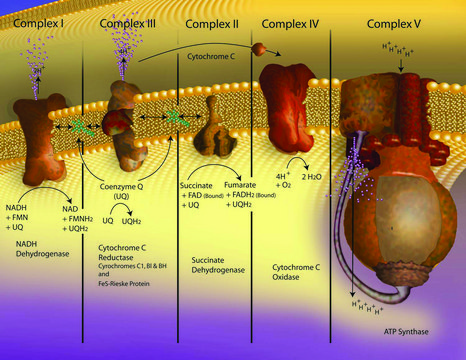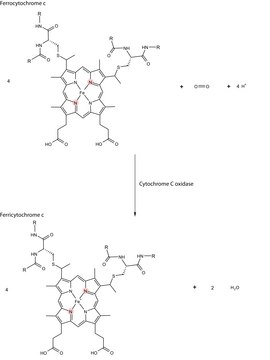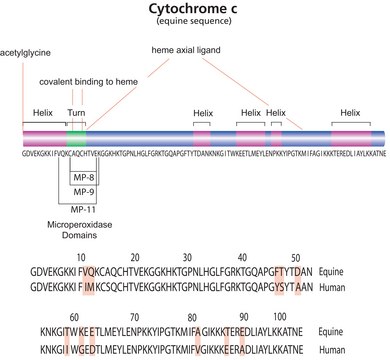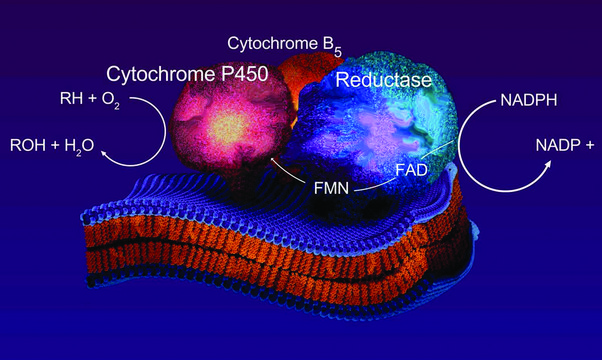C3483
Cytochrome c from human heart
≥95% (SDS-PAGE), lyophilized powder
Se connecterpour consulter vos tarifs contractuels et ceux de votre entreprise/organisme
About This Item
Produits recommandés
Source biologique
human heart
Niveau de qualité
Essai
≥95% (SDS-PAGE)
Forme
lyophilized powder
Poids mol.
11 kDa by SDS-PAGE
Technique(s)
cell culture | mammalian: suitable
mass spectrometry (MS): suitable
western blot (chemiluminescent): suitable
Numéro d'accès UniProt
Température de stockage
−20°C
Informations sur le gène
human ... CYCS(54205), CYCSL1(157317)
Description générale
Cytochrome c (CYCS) is mapped to human chromosome 7p15.3. CYCS is a heme protein containing three long α-helices. It undergoes domain swapping at the C-terminus and exists in dimeric, trimeric, and tetrameric forms. Insertion mutations in CYCS is implicated in acute myeloid leukemia. Mutations in CYCS modulates the release of proplatelets and decreases platelet production leading to thrombocytopenia 4.
Application
Cytochrome c from human heart has been used for the generation of standard curves in the electrochemiluminescence assay for measurement of cytochrome C levels in plasma samples and in electrospray ionization mass spectrum (ESI-MS) analysis.
Cytochrome c has been identified as an important mediator in apoptotic pathways. The release of mitochondrial cytochrome c into the cytoplasm stimulates apoptosis and is commonly used as an indicator of the apoptotic process in the cell. Investigation on the effect of Paris Saponin I (PS I) on human gastric carcinoma cell growth (SGC7901 cells) have shown an elevated level cytoplasmic cytochrome c. Results are an inhibition of proliferation in SGC7901 cells by inducing mitochondria-dependent apoptosis through cytochrome c.
Actions biochimiques/physiologiques
Cytochrome c is a small heme protein that is a mobile electron carrier in the mitochondrial electron transport chain. It is also an initiator of apoptosis.
The ready fluctuation of cytochrome c within the cell between ferrous and ferric states, makes it an efficient biological electron-transporter. It plays a vital role in cellular oxidations in both plants and animals. Generally regarded as a universal catalyst of respiration, it forms the essential electron-bridge between the respirable substrates and oxygen.
The ready fluctuation of cytochrome c within the cell between ferrous and ferric states, makes it an efficient biological electron-transporter. It plays a vital role in cellular oxidations in both plants and animals. Generally regarded as a universal catalyst of respiration, it forms the essential electron-bridge between the respirable substrates and oxygen.
In addition to its function in electron transport, cytochrome c acts as an apoptosis-triggering agent, forming the apoptosome with apoptosis protease-activating factor-1 (Apaf-1) and activating the caspase cascade. The two functions are finely tuned by phosphorylation of Tyr residues at position 48 and/or 97. One recent report provides suggestive evidence that phosphorylation at Tyr48 switches off the apoptotic effect.
In addition to its function in electron transport, cytochrome c acts as an apoptosis-triggering agent, forming the apoptosome with apoptosis protease-activating factor-1 (Apaf-1) and activating the caspase cascade. The two functions are finely tuned by phosphorylation of Tyr residues at position 48 and/or 97. One recent report provides suggestive evidence that phosphorylation at Tyr48 switches off the apoptotic effect.
Forme physique
Lyophilized from a 0.2 μm filtered solution in phosphate buffered saline.
Notes préparatoires
Chemically oxidized during purification.
Autres remarques
View more information on cytochrome c and electron transport at www.sigma-aldrich.com/enzymeexplorer.
Code de la classe de stockage
13 - Non Combustible Solids
Classe de danger pour l'eau (WGK)
WGK 3
Point d'éclair (°F)
Not applicable
Point d'éclair (°C)
Not applicable
Faites votre choix parmi les versions les plus récentes :
Déjà en possession de ce produit ?
Retrouvez la documentation relative aux produits que vous avez récemment achetés dans la Bibliothèque de documents.
Les clients ont également consulté
Notre équipe de scientifiques dispose d'une expérience dans tous les secteurs de la recherche, notamment en sciences de la vie, science des matériaux, synthèse chimique, chromatographie, analyse et dans de nombreux autres domaines..
Contacter notre Service technique



